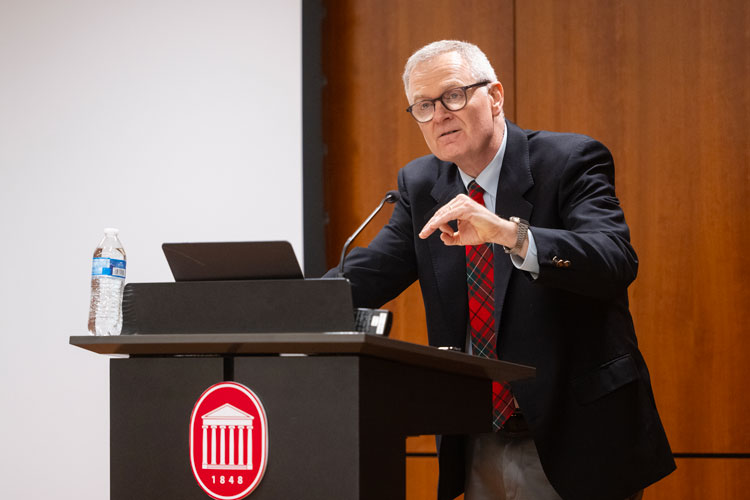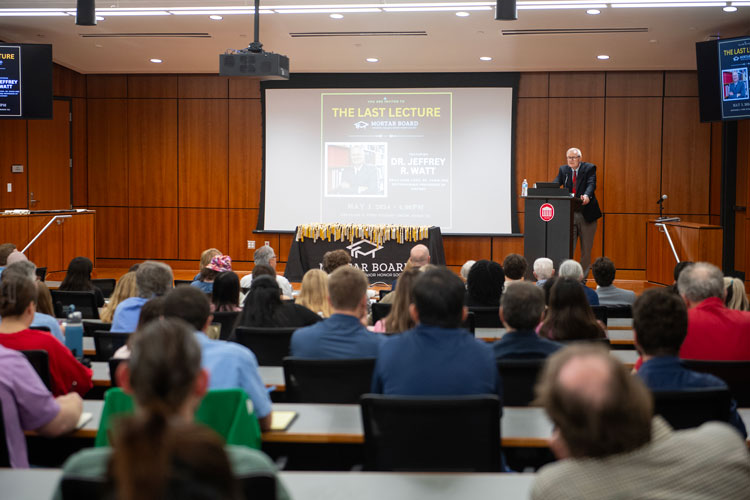
Discusses decades-long project transcribing records from theologian John Calvin
Covering topics from marriage contracts to demonic possession, University of Mississippi historian Jeffrey Watt explored aspects of daily life in Early Modern Europe in Friday, May 3, 2024, during the Mortar Board’s Last Lecture.
“It’s a brief motorcycle ride through a museum of some of the interesting things I’ve found over the last 40 years studying Early Modern Europe,” Watt said.
The Last Lecture was created by the UM Tassels Chapter of Mortar Board, based on Randy Pausch‘s 2008 book of the same name. The organization asks one university professor to deliver a lecture to end the academic year as if it were the last of their career. For Watt, it was literal.
The university’s Kelly Gene Cook Sr. Chair and distinguished professor of history, Watt is retiring at the end of the semester. He joined the university in 1988, and his research is focused on the history of the Reformation, especially the Protestant Reformation.
“We were pleased to invite Dr. Watt to deliver this year’s lecture as a culminating experience of his notable career as a professor and researcher of Early Modern Europe with a special focus on the Reformation,” said Brent Marsh, assistant vice chancellor for student affairs. “Dr. Watt shared fascinating stories based on historical records from the period, which truly held the audience’s attention.”
In the lecture, Watt described this work with historical court records, including matrimonial litigation.
“I was interested in how people formed marriages and how authorities dealt with marriages, including divorce,” he said. “I have always been interested in studying court records, which have been the basis for all of my historical research and the books I’ve written.
“I feel court records give a window into everyday life – the people who were not rich, not powerful – everyday folks.”
What began as a research trip to Italy to study the history of the Catholic reformation ended in Watt’s discovery of record of a group demonic possession in the convent of Santa Chiara. This research led to his 2009 book, “The Scourge of Demons: Possession, Lust and Witchcraft in a Seventeenth-Century Italian Convent.”
“Fourteen nuns in one convent were allegedly possessed by demons, and this led to a very interesting and very lengthy investigation of the nuns and the allegations of witchcraft,” he said.
Ultimately, the Roman Inquisition became involved and questioned exorcists for their perceived knowledge of the possessions. The women were described as screaming, throwing their veils, contorting their bodies and even passing gas for hours on end, Watt said.
“Possession was, in many ways, a culture-bound syndrome strongly shaped by the stereotypes that you can find in exorcism manuals, genealogical handbooks and in popular literature as well,” Watt said.
Fortunately, Watt said, the case ended with no executions.
Watt has worked for nearly 40 years on the Consistory of Geneva, which was created by the 16th-century reformer John Calvin.
“Calvin put a lot of emphasis on discipline,” Watt said. “He introduced the Consistory, a morals court to address the desire for a well-disciplined society.”
The records provide insight into Calvin’s role as a pastor and the daily lives of people during the Protestant Reformation.
After securing some $375,000 in grants, Watt is nearing completion of publishing all 21 volumes of these difficult-to-read manuscripts, which document the Consistory’s enforcement of moral discipline and represent a key source for scholars studying the Reformation’s social impacts.
“We have three more volumes to go, and we hope to finish them up in about three or four years,” he said. “They are a goldmine of information and provide a front-row seat to the reception of Calvin in Geneva.”
Although retirement is on the horizon, Watt plans to continue his research. His current project involves a microhistory surrounding a seventeenth-century father and son: the father, a war hero who died heroically, and his son, who was ultimately convicted of treason and sodomy.
Maren Egging, a Pella, Iowa, native majoring in finance, real estate and insurance, said Watt’s lecture was the last she would attend as a graduating senior, and it was a “full-circle moment.”
“I want to hold on to college forever, but I am excited for a new beginning,” Egging said. “There’s some closure with this last lecture and I’m sure Dr. Watt feels the same way.”
Ross Cohen, a junior majoring in accounting and public policy leadership, is chair of the Last Lecture planning committee.
“Departments nominate candidates for the Last Lecture each year, which is fantastic because they are given the opportunity to promote one of their own and their accomplishments,” the Oxford native said. “It’s also very special because Dr. Watt’s family is in attendance, and they are able to witness one of his last times speaking in an academic setting.”
Professors giving the lecture are asked to consider their legacy in higher education and what they would like to impart to students as their final thoughts. For Watt, the answer is simple.
“History is worth studying; Early Modern European history is worth studying,” Watt said. “It’s a fascinating subject – it’s full of contradictions, it can be fascinating, enlightening, depressing as well, but it’s never boring.”
By Erin Garrett





